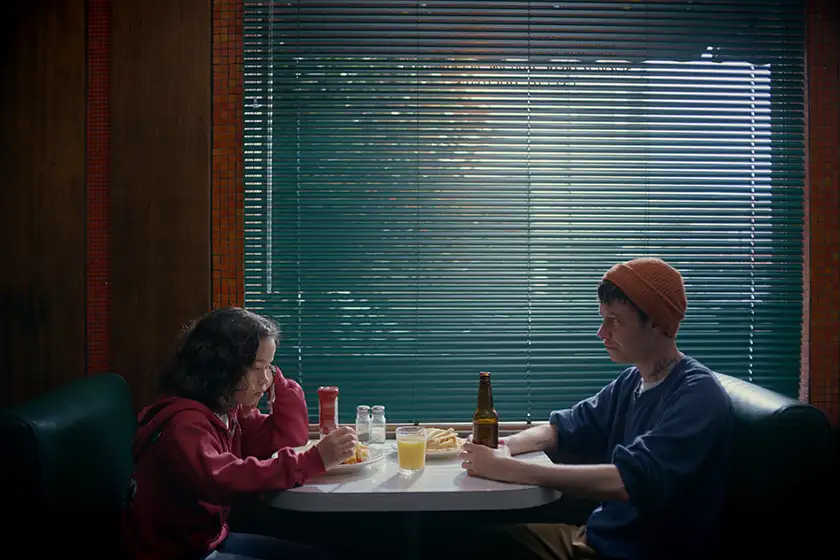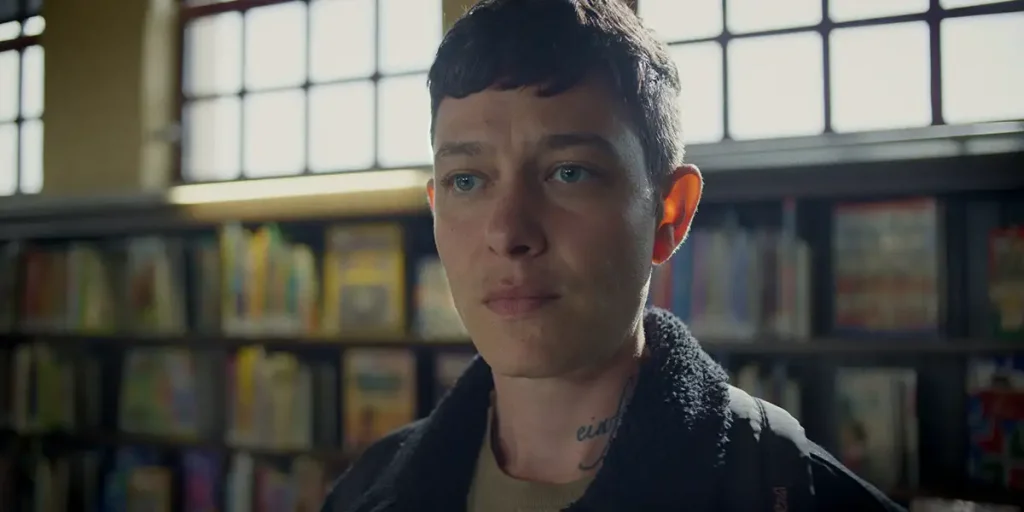Asia Kate Dillon shines in Outerlands, a drama about a non-binary person struggling to get by in an increasingly gentrified San Francisco.
Director: Elena Oxman
Genre: Drama, Family
Run Time: 100′
BFI Flare Screening: March 22-23, 2025
U.S. Release Date: TBA
U.K. Release Date: TBA
In Elena Oxman’s debut film Outerlands, Cass (Asia Kate Dillon, Billions and John Wick 3 – Parabellum) is trying to get by. A non-binary person living in San Francisco as it is being increasingly gentrified, Cass has to balance multiple jobs to pay for their small one-bedroom apartment. They juggle being a waiter at a fancy restaurant and a babysitter for two rich kids, whilst also making money as a drug dealer.
Even if they had time to socialise, Cass lives a solitary existence, backing out of invites from fellow waiter Emile (Daniel K. Issac, also from Billions) and drinking alone. One night though, at the laundromat, they make friends with Kalli (Louisa Krause, Maggie Moore(s)), a single mother who recently moved to San Francisco and also works at the restaurant. That leads to a one-night stand.
When Kalli needs to head to Reno for a couple of days, she asks Cass to watch her 12-year-old daughter Ari (Ridley Asha Bateman, Lou). But then Kalli doesn’t return their calls, and it becomes clear that she isn’t coming back, at least for a while. So Cass will have to take care of Ari for an indefinite period. And in the process, they will have to face their addiction and the demons of their past.
What’s notable about Outerlands is how writer-director Oxman turns San Francisco into a character of its own, and a deeply complex one mirroring the gentrification that has ramped up in recent years in real life. A similar theme was tackled recently in Joe Talbot’s exceptional 2019 feature The Last Black Man in San Francisco, about two men trying to reclaim a Victorian home in the heart of the city before the area is snatched up by developers. And like that film (which focused on Black low-income residents being displaced), Oxman looks at the adverse impact on a community of minorities.
The city has famously been a haven for LGBTQ+ people, but now the nighttime streets are empty and muted. When Cass does go out one night, one bar charges $20 for its queer night whilst another nearby has shut down. A sense of community has been lost, and it leads to Cass becoming even more of a lone wolf.

There is a realistic air to Cass and Ari’s relationship. Cass’s attempts to bridge their divide are met with truncated conversations and silenced by Ari. And that is conveyed perfectly by Asia Kate Dillon and Ridley Asha Bateman, who both shine with their performances. Dillon (who is also a producer) is always engaging as a person having to navigate the gig economy to survive in this city. That means going through receipts, dealing with scummy landlords and trying to reopen checking accounts (which leads them to supportive bank employee Denise, played by Dillon’s former Orange is the New Black co-star Lea DeLaria). Meanwhile, Bateman’s Ari is as independent and closed-off as Cass but is also more optimistic, a difference that signifies the childhood trauma Cass went through.
The title of Outerlands comes from a game cartridge in Cass’ old SNES console. The pair both play video games on their phones or game systems, and it is what Cass uses to bond with Ari. But at the same time, it comes in a box of old things that they hid away in their closet. It represents a past life (and name) that they tried to forget or cover up with stickers. Yet when Ari is gone, Cass is drawn further into their old game, a possible form of escapism from past and present loneliness.
Elena Oxman has created an intriguing story with Outerlands. Events play out naturally, the dialogue succeeds in not being expository, and the film manages to articulate the modern-day struggles and vulnerabilities of queer people and those living paycheck to paycheck. The main problem is that it takes a while to reveal Cass’ character to the audience, from their past circumstances and abandonment by their mother to their current alcoholism. Cass is crucial but the examination of them seems overshadowed by the gentrification subtext, and more could have been done to emotionally attach us to the character. Still, the film works thanks to Dillion and Bateman’s dynamic and the versatile, mobile camerawork from DP Lucia Zavarcikova.
San Francisco may be rapidly changing, ominously signified by a shot of skyscrapers and huge cranes. And Cass’ recovery may be dependent on moving on from the city, in a bittersweet ending that raises questions about the continued loss of the LGBTQ+ community. But Outerlands makes great points about found family, the long road to self-acceptance and finding a sense of belonging from both things. Here, the key to healing oneself is through connection to others. It is, in the words of Raymond Carver from the poem that opens the film, ‘Late Fragment’, “to feel myself beloved on the earth.”
Outerlands: Movie Plot & Recap
Synopsis:
Cass is a non-binary person living in San Francisco, working multiple jobs to get by. When they are forced to babysit Ari, a co-worker’s 12-year-old daughter for an indefinite amount of time, Cass is forced to confront the demons of their past.
Pros:
Pros:
- Elena Oxman sets out to make a film about found family and acceptance, and she succeeds.
- The way Oxman presents the increasingly gentrified San Francisco is deeply complex and adds to the sense of loneliness and lost community in the story.
- Asia Kate Dillon and Ridley Asha have a very good and natural dynamic.
Cons:
- It takes a while to reveal Cass’ character to the audience, and the film could have done more to emotionally attach us to the character.
Outerlands was screened at BFI Flare on March 22-23, 2025. Read our BFI Flare reviews and our list of 10 movies to watch at BFI Flare 2025!

